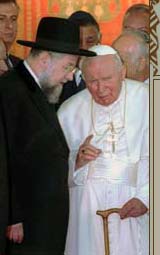
Conference recalls historic Vatican document.
Jews and Catholics must continue with interfaith dialogue and educate their co-religionists on their historic rapprochement that began a scant 40 years ago, a day-long conference at the University of Toronto heard last week.
After nearly two millennia of hatred, oppression, vilification and annihilation of Jews by Catholics, the last four decades of reconciliation are "just the beginning of the beginning," and there’s much work to be done, more than 100 Christian and Jewish participants heard at last Thursday’s seminar, which marked the 40th anniversary of a landmark Vatican document that laid the foundation for the Catholic Church’s improved relations with non-Christians, especially Jews.
Nostra Aetate, (Latin for "In Our Time"), issued by the historic Second Vatican Council on Oct. 28, 1965, represented a turning point for the Church. The document deplored Christian anti-Semitism, stated that God’s covenant with Jews is irrevocable, and repudiated the age-old deicide charge that blamed Jews for the death of Jesus.
Another major achievement of Nostra Aetate has been that Catholics no longer missionize to Jews and have abandoned the notion that Judaism is a failed religion that has been replaced by Christianity. Christianity has not replaced Judaism, but improved it.
In 2000, scholars produced Dabru Emet ("Speak the Truth"), a Jewish response to Nostra Aetate that suggested Jews should view Christians in a better light. Many Jews, he said are "unaware" of the respect and friendship for them that Nostra Aetate produced. "For that, we need education."
Opening the archives "will remove suspicions and contribute to a more mature understanding," he said, but he didn’t indicate when or if that would happen.
While Jews and Catholics disagree on who is the messiah, what unites them is the shared belief "in an unredeemed world that needs a messiah," Cardinal Cassidy said.
A gloomier picture was painted by the chief rabbi of Rome, Riccardo Di Segni, who said that Catholics tend to regard Jews "like a beautiful piece of silver on a shelf to be shown to guests, but not as a vibrant religious people that has a mission and strength."
The two faiths have had 40 years to implement mutual respect, but Rabbi Di said he can’t agree that "the era of suspicion is finished."
Adapted from an article by Ron Csillag staff reporter to the Canadian Jewish News
No comments:
Post a Comment